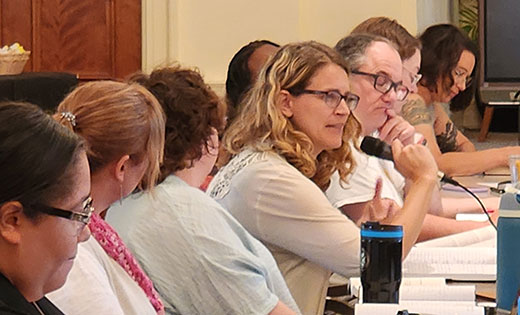Hybrid Doctor of Ministry in Creative Writing and Public Theology
Join the Next Creative Writing and Public Theology Cohort
Engage your theological imagination and craft your public voice through creative writing! The Doctor of Ministry program invites students into a community of inquiry that accepts the unfinishedness of both theology and creative writing. During this hybrid program, you will explore the fluid dimensions of faith and the complexities of your vocational context with your cohort, our faculty, and the reading public. At the end of your coursework, you will write a publishable manuscript that engages your vocational context in conversation with your coursework. You will also produce a statement of vocation in public theology and offer a public reading and discussion of your creative work.
The next cohort kicks off June 22-26, 2026, with Drs. Donna Giver-Johnston and Liberty Ferda teaching "Voice, Faith, and Place in Public Theology and Creative Writing".
When and where do the classes meet?
The Theological Content courses are held in person at Pittsburgh Theological Seminary in Pittsburgh, Pa., and St. Petersburg, Fla., during alternating one-week blocks of time in January and June. These are followed by 10-week online workshops dedicated to the Craft of Writing in different genres.
Course Topics
Voice, Faith, and Place in Public Theology and Creative Writing
The purpose of this course is to launch our conversation about the general themes that will occupy the cohort throughout the next several years -- these include engagement of the writer’s voice, the role of faith in creative writing, the writer’s sense of place in writing, the nuances of theological reflection, and the practices and concerns of writing creatively. We will spend time together mapping the features of a new approach to public theology and think together and about what it means to be a public theologian engaged in the vocation as a creative writer. Rather than providing answers, the course aims to surface questions and ideas for students to engage over the course of the program. Additionally, the course will help students and faculty establish collegial working relationships with each other so that a community of writers might be established.
Creative Writers as Public Theologians
As a writer deeply invested in the intersections of identity, belief, and narrative, I envision this course as a means of examining how fiction, nonfiction, and hybrid forms can serve as tools for ethical inquiry, moral critique, and communal reflection. Drawing on diverse voices, we’ll investigate the writer’s potential role as both witness and prophet in the public sphere. Through writing and discussion, students will be encouraged to craft narratives that engage with the sacred and the secular to imagine more just futures.
The Gospels as Literature
This course introduces students to the study of the Gospels as works of literature in their own right. We read each of the four Gospels through lenses that have emerged from literary studies more broadly, attending to genre conventions, use of tradition, structure, plot, characterization, and intertextuality. While the course has a historical orientation—that is, we are seeking to understand the texts on their own terms in their own historical context—students are invited to draw and analyze potential parallels between the Gospels and their own work as writers and public theologians in our contemporary context.
Theology, Ecology, and Writing
In this course we will examine the interplay between science and religion by examining ecological and theological perspectives on climate change. We will begin with an exploration of how ecology and Christian theologies see the relationship between humans and nature. From there, we will delve into climate change, asking how theological and ecological viewpoints contribute to our understandings of the problem and how each elicits responses in the form of social action and policy. The course will end with an examination of how partnerships between scientific communities and communities of faith are addressing climate change and environmental justice.
Black Women’s Leadership in the Civil Rights Movement
What compels a person to risk her life to change deeply rooted systems of injustice in ways that may not benefit her? The thousands of Black Churchwomen who took part in civil rights protests drew on faith, courage, and moral imagination to acquire the lived experiences at the heart of the answers to that question. AnneMarie Mingo brings these forgotten witnesses into the historical narrative to explore the moral and ethical world of a generation of Black Churchwomen and the extraordinary liberation theology they created. These women acted out of belief that what they did was bigger than themselves. Taking as their goal nothing less than the moral transformation of American society, they joined the movement because it was something they had to do. Their personal accounts of a lived religion enacted in the world provide powerful insights into how faith steels human beings to face threats, jail, violence, and seemingly implacable hatred. Throughout, Mingo draws on their experiences to construct an ethical model meant to guide contemporary activists in the ongoing pursuit of justice. A depiction of moral imagination that resonates today, Have You Got Good Religion? reveals how Black Churchwomen’s understanding of God became action and transformed a nation.
Creative Writing Courses
Explorations in Creative Writing: Section 1
This course will explore contemporary poetry, fiction, and creative nonfiction through readings, discussions, writing exercises and student writing workshops. It will engage a variety of topics and subjects. Students will practice/experiment with writing each of the three genres as well as making constructive comments on the work of peers in the workshop setting. The course will spend roughly three weeks or so on each genre, such that students gain exposure and practice with all three genres. Students will take 3 of these multi-genre creative writing classes during their 3-year program, and each will vary in its readings and assignments according to the instructor. This structure encourages students to continually practice various genres (while also allowing time each term for students to develop skills in a genre they may choose to focus their final project on).
Explorations in Creative Writing: Section 2
This course will explore contemporary poetry, fiction, and creative nonfiction through readings, discussions, writing exercises and student writing workshops. It will engage a variety of topics and subjects. Students will practice/experiment with writing each of the three genres as well as making constructive comments on the work of peers in the workshop setting. The course will spend roughly three weeks or so on each genre, such that students gain exposure and practice with all three genres. Students will take 3 of these multi-genre creative writing classes during their 3-year program, and each will vary in its readings and assignments according to the instructor. This structure encourages students to continually practice various genres (while also allowing time each term for students to develop skills in a genre they may choose to focus their final project on).
Creative Writing in the Public: Launching Your Work into the World, Section 1
This course will combine creative writing practice and workshop with discussions and explorations about “public” possibilities of launching creative writing into the world. We will grow a layered and expansive conversation about publishing that invites students to find, follow, and live into new questions about what, how, with whom, and why they want to share what they are called to share in the world. Potential questions include: What do I want from my writing? What does my church want for my writing? What does society want from my writing? What does God want from my writing? Potential public venues for writing/stories may include blogs, readings, public events and readings, radio, formal book publishing, or others. Students will: 1) reflect on their personal approach/beliefs/feelings/stories around writing, publishing, and ministry; 2) connect, extend, and be inspired from the processes of others; 3) engage collaboratively through giving-receiving feedback on creative writing and proposal research/writing; 4) inquire, revise, and reflect in meaningful ways connected to their personal writing, ministry, and life.
Students will also begin the process of writing a proposal for their final CWPT project for their degree at PTS. (The proposal includes a 2–5 page essay, bibliography, and 5–10 page sample of writing.)
This course will also offer some craft lessons and practice with multiple creative writing genres, though there will be less time spent on this compared to the Explorations in Creative Writing craft courses.
Creative Writing in the Public: Launching Your Work into the World, Section 2
This course will combine creative writing practice and workshop with discussions and explorations about “public” possibilities of launching creative writing into the world. We will grow a layered and expansive conversation about publishing that invites students to find, follow, and live into new questions about what, how, with whom, and why they want to share what they are called to share in the world. Potential questions include: What do I want from my writing? What does my church want for my writing? What does society want from my writing? What does God want from my writing? Potential public venues for writing/stories may include blogs, readings, public events and readings, radio, formal book publishing, or others. Students will: 1) reflect on their personal approach/beliefs/feelings/stories around writing, publishing, and ministry; 2) connect, extend, and be inspired from the processes of others; 3) engage collaboratively through giving-receiving feedback on creative writing and proposal research/writing; 4) inquire, revise, and reflect in meaningful ways connected to their personal writing, ministry, and life.
Students will also begin the process of writing a proposal for their final CWPT project for their degree at PTS. (The proposal includes a 2–5 page essay, bibliography, and 5–10 page sample of writing.)
This course will also offer some craft lessons and practice with multiple creative writing genres, though there will be less time spent on this compared to the Explorations in Creative Writing craft courses.
Manuscript Writing, Part 1
In this class, students will utilize skills cultivated in craft of writing courses to develop, or continue to develop, a focused body of work toward the end goal of a final creative writing project. Students may wish to develop about half of their final estimated page count, though this remains flexible as the project is being developed (See final page count estimates in DM 950-2 Part TWO description below).
Classes will meet every other week, allowing space between meetings for students to work on their own pages while preparing for workshop and completing any course readings or other assignments. Classes will be led by writing instructors who will work with students this semester and the next (final) semester of the program. Thus, courses will be capped at 7 to allow for the focused, individualized instruction.
Students will also further develop their proposals for their CWPT final project and will submit them for approval by the end of the course. (Students will receive their assigned Theology reader and will begin developing their Theology proposal in consultation with that Theology reader as well—the timeline for that is not tied to this class but should happen by December).
Manuscript Writing, Part 2
This final course involves students developing their final projects in consultation with their creative writing reader (no group meetings). Students should submit polished/revised pages to their reader by Feb. 15, and the instructor will read carefully, make comments, meet with students as needed, and request revisions by March 15. Students will then make final edits and turn them in by April 15 for final approval prior to graduation.
Final Creative Writing Project page count estimates:
- Poetry: ~ 35 pages
- Short story: ~ 80–100 pages
- Longform narrative fiction or nonfiction (novel or book): ~ 125 pages
- Mixed Genre: ~75 pages
The program will culminate in a final public reading and celebration in May.
2024-2027 Cohort Schedule
| Date | Course |
|---|---|
| June 17-21, 2024 | DM900 Voice, Faith, and Place in Public Theology and Creative Writing Donna Giver-Johnston, Ph.D. (Faculty Mentor) Director of the Doctor of Ministry Program, PTS Liberty Ferda, Ph.D. (Faculty Mentor) |
| July 29- Oct. 11, 2024 (Group A) |
DM910-1 Bearing Witness, Writing Trauma: Creative Nonfiction Peter Trachtenberg, Ph.D. |
| July 29-Oct. 11, 2024 (Group B) |
DM910-2 Experimental Prose and Poetry Diane Glancy, Ph.D. |
| July 29-Oct. 11, 2024 (Group C) |
DM910-3 Short Story: Fiction Jimmy Cajoleas, Ph.D. |
| Jan. 20-24, 2025 | DM 940 Storytelling for Times Such as These Gareth Higgins, Ph.D. |
| Feb. 24-May 9, 2025 (Group A) |
DM930-1 Poetry Lori Jakiela, Ph.D. |
| Feb. 24-May 9, 2025 (Group B) |
DM930-2 Multi-genre Spiritual Writing Isaac Anderson, Ph.D. |
| June 16-20, 2025 | Thomas Merton: Monk, Poet, and Social Critic L. Roger Owens, Ph.D. Hugh Thomson Kerr Professor of Pastoral Theology, PTS |
| Aug. 4-Oct. 17, 2025 (Group A) |
DM950-1 Memoir Lori Jakiela, Ph.D. |
| Aug. 4-Oct. 17, 2025 (Group B) |
DM950-2 Writing for Children Melissa Butler, Ph.D. |
| Jan. 19-23, 2026 Florida |
DM961 Theology, Ecology, and Writing Andrea Lloyd, Ph.D. and Andy Nagy-Benson, D.Min. |
| Feb. 23-May 8, 2026 (Group A) |
DM970-1 Creative Writing in the Public: Launching Your Work into the World Jimmy Cajoleas, Ph.D. |
| Feb. 23-May 8, 2026 (Group B) |
DM970-2 Creative Writing in the Public: Launching Your Work into the World Melissa Butler, Ph.D. |
| June 15-19, 2026 |
DM920 Bible, Storytelling and the Christian Imagination |
| Aug. 3-Oct. 16, 2026 | DM990 Manuscript Writing PART ONE Melissa Butler, Ph.D., Lori Jakiela, Ph.D., Jimmy Cajoleas, Ph.D., Peter Trachtenberg, Ph.D. |
| Feb. 16-May 8, 2027 | DM990 Manuscript Writing PART TWO Melissa Butler, Ph.D., Lori Jakiela, Ph.D., Jimmy Cajoleas, Ph.D., Peter Trachtenberg, Ph.D. |
| Independent Study | DMCWFP Final Project (6 Credits) |
2026-2029 Cohort Schedule
| Date | Course |
| In-Person Intensives | |
| June 22-26, 2026 | Voice, Faith, and Place in Public Theology and Creative Writing Donna Giver-Johnston, Ph.D. (Faculty Mentor) Director of the Doctor of Ministry Program Liberty Ferda, MFA (Faculty Mentor) |
| Jan. 11-15, 2027 | Creative Writers as Public Theologians Donald E. Quist, Ph.D. Assistant Professor, University of Missouri |
| June 14-18, 2027 | The Gospels as Literature Tucker Ferda, Ph.D. Errett M. Grable Associate Professor of New Testament Exegesis and Early Christianity |
| Jan. 24-28, 2028 | Theology, Ecology, and Writing Andy Nagy-Benson, D.Min. Andrea Lloyd, Ph.D. |
| June 19-23, 2028 | Black Women’s Leadership in the Civil Rights Movement AnneMarie Mingo, Ph.D. Associate Professor of Ethics, Culture, and Moral Leadership and Director of the Metro-Urban Institute |
| Online Weekly Courses | |
| July - October 2026 | Creative Writing Courses Term 1: Explorations in Creative Writing: Section 1 Explorations in Creative Writing: Section 2 |
| February - May 2027 | Creative Writing Courses Term 2: Explorations in Creative Writing: Section 1 Explorations in Creative Writing: Section 2 |
| August - October 2027 | Creative Writing Courses Term 3: Explorations in Creative Writing: Section 1 Explorations in Creative Writing: Section 2 |
| February - May 2028 | Creative Writing in the Public: Launching Your Work into the World, Section 1 Creative Writing in the Public: Launching Your Work into the World, Section 2 |
| August - October 2028 | Manuscript Writing, Part 1 |
| February - May 2029 | Manuscript Writing, Part 2 |
LEARN MORE ABOUT PITTSBURGH SEMINARY’S D.MIN. PROGRAM
Connect with the Doctor of Ministry Office to learn more about our next Creative Writing and Public Theology cohort. We'd love to have you join us! Apply now to reserve your space in a future focus. Financial aid and scholarships are available for those who qualify.





